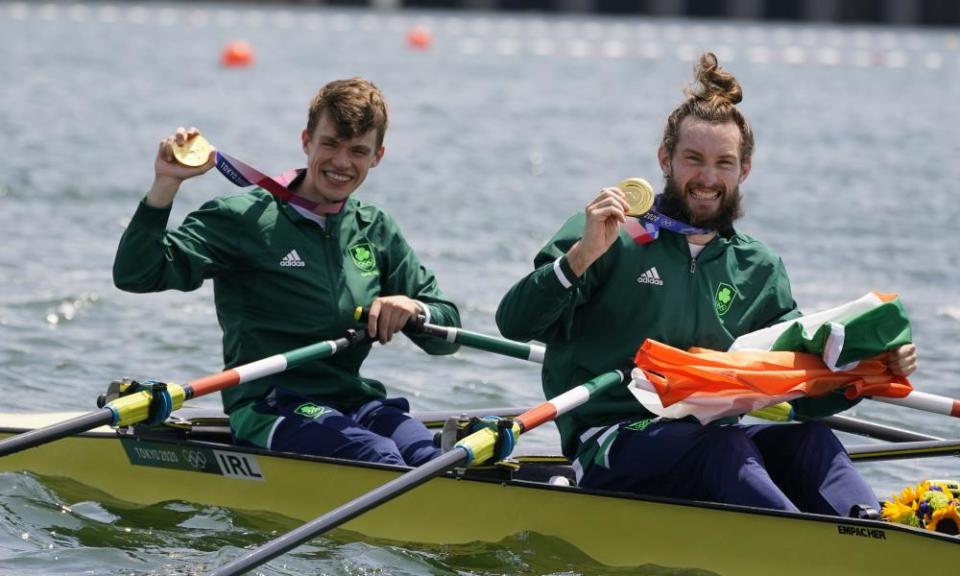Paul O’Donovan and Fintan McCarthy win Ireland’s first Olympic rowing gold

Paul O’Donovan andFintan McCarthy won Ireland’s first gold medal of the okyo Olympics on Thursday with a stunning victory in the lightweight men’s double sculls at the Sea Forest Waterway. It was Ireland’s first Olympic gold medal since 2012, its 10th in total, and its first in rowing.
In blustery conditions, the 27-year-old O’Donovan and 24-year-old McCarthy set a time of 6min 6.43sec, finishing ahead of the German duo Jonathan Rommelmann and Jason Osborne. Italy claimed bronze.
Related: No fairytale finish for Helen Glover after the mother of all comebacks
Having started the race as favourites, the Irish pair fell behind Germany and Italy and at one point trailled the leading pair by 1.4 seconds. However, setting a steady pace, they prospered as the other two faded, overtaking the Italians at the midway point and taking the lead from Germany just before the 1500m mark.
In a humorous interview with the BBC, asked how being an Olympic gold medal-winning athlete sounded, O’Donovan said: “It’s alright, yeah. You can’t complain about it really. I wouldn’t go around introducing myself like that though.”
He told RTÉ Sport: “The race plan we had, we do it all the time and it seems to work out OK for us. We kind of know that Italy and Germany always go hard, you can count on that. Then they slow down a bit. Once we were catching up to them, we knew that we were at a sustainable pace and kept going. You don’t really take in the history of the moment. You’d be well tired after the race.”
O’Donovan has previously tasted Olympic success, having won silver in the same event five years ago in Rio, that time partnered with his brother Gary. He also has four world championship gold medals and two European gold medals.
McCarthy said: “It is bizarre, I have been pretty chilled out all day. Usually, I would be a bit more nervous. I felt really prepared and you know how that expectation and stuff doesn’t really weigh too heavily on us. We just do what we always do as best we can and it worked.”

The pair’s gold medal at the 2020 Games adds to the bronze that the Irish women’s coxless four – Aifric Keogh, Eimear Lambe, Fiona Murtagh and Emily Hegarty – won on Wednesday.
Ireland first competed as an independent country in the 1924 Olympic Games in Paris, and has won 33 summer Olympic medals. The 2012 London Olympics brought their best medal haul at a single event with six and at the 1996 Atlanta Games they took a record three golds, with Michelle Smith winning three times in the pool. Those medals have continued to stand, despite her later being embroiled in a doping controversy and banned from competition for four years.
Before 1924, Irish athletes competed as part of the Great Britain team. One of the first notable acts of protest at an Olympic Games came in the special Athens event in 1906, when, having finished second in the long jump, Ireland’s Peter O’Connor climbed up the flagpole during the winners’ ceremony to replace the British flag with an Irish one he had smuggled in.
Friday’s final day of rowing will feature races in the men’s and women’s single sculls and the men’s and women’s eights.

 Yahoo Finance
Yahoo Finance 